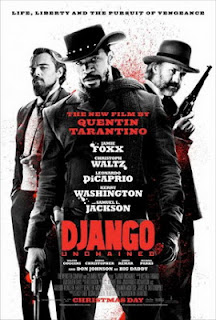Wednesday, 27 February 2013
Django Unchained
In Django Unchained, Quentin Tarantino brings his unique talents and style to the cowboy western, maybe trying to breath new life into a genre that was once the staple diet of Hollywood in it's early years. Jamie Foxx stars as Django, an African-American slave who is purchased by bounty hunter Dr. King Schultz, with the agreement that Django help identify certain wanted killers with a bounty on their heads in exchange for his freedom, $75 and a horse. Django shows a certain flair in this line of work, so Schultz suggests that they pair up as bounty hunters over the winter and then search for Django's wife, Broomhilda, who has been sold away as a slave and thus separated from her husband. The pair eventually track her down, learning that a plantation owner called Calvin Candie has bought Broomhilda. Leonardo DiCaprio is excellent as the charming but morally repulsive Candie, and plays the part with great panache, but again, as in Inglourious Basterds, it is Christoph Waltz who steals the show, this time as Dr. King Schultz. How this fine actor almost slipped under the radar is beyond me, but he is now getting the film roles appropriate to his talents, albeit late in his career. Jamie Foxx leads the film well but the other standout performance is Samuel L Jackson as Candie's institutionalised black manservant, possibly Jackson's best role since Lakeview Terrace. The whole issue of race is dominant throughout the film, and Tarantino pulls no punches in depicting the ugliness and inhumanity of slavery, but garnering different responses. Film maker Spike Lee refused to see the film as he thought Tarantino's Spaghetti Western approach to Django Unchained was disrespectful to his black ancestors, while commentator Jeff Kuhner felt that the portrayal of white characters in the film was in a sense anti-white. Indeed the only good white character in the film is Schultz. Another talking point about Django Unchained is the excessive and gory violence. Tarantino continually defends the violence in his films because he feels that it is not realistic or believable violence, his depiction is more operatic and theatrical, and I am sure he uses the same argument in defending Django Unchained. The script is as sharp and original as they come and, although there is nothing funny about slavery, there are some nice touches of humour throughout. It's not my favourite Tarantino film, but it's well worth watching. And you can't beat a good western. 7/10
Monday, 4 February 2013
David Beckham - most overhyped brand ever?
When the legendary Pele published a list of the greatest one hundred footballers of all time it caused quite a few eyebrows to be raised in consternation and annoyance. I am going to sidetrack all the arguments about what Brasilians should have and should not have made the list, and head for the green fields of England. The fact that David Beckham made the list was a truimph of modern marketing and PR. David Beckham is a good looking guy who can find the net with free kicks. He's a decent player, nothing more. Thus I have been constantly mystified by the success and adulation that he has receieved over the years. In interviews he has the charisma and intellect of a boiled potato. There are much better and more intelligent players who have not enjoyed his celebrity status and earning power. He has become an carefully marketed brand, playing into the hands of our society's obsession with celebrity culture. An example is his recent PR stunt with Paris St Germain. He has made it very vocal to the press that he is donating all his wages to a French children's charity. Now I am glad that a charity will be a few million Euros richer, that's great, but why the need to harp onto the press about it. I am not a natural cynic but the whole situation smacks of Beckham trying to boost his public image and convince us what a wonderful guy he is. It's pretty pathetic.
Subscribe to:
Comments (Atom)


